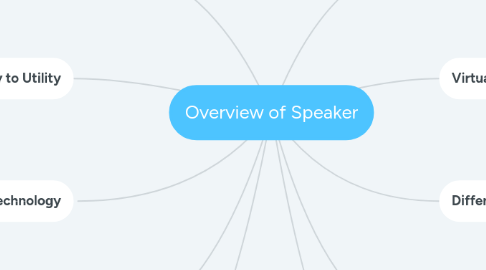
1. Augmented Reality
1.1. Experience: Supplemented
1.1.1. Device: HMD, HUD
1.1.1.1. Example: Snap Spectacles and Holo Lens
1.1.1.1.1. Use Cases: Education, Commerce, Gamers
2. Virtual Reality
2.1. Experience: Fully Immersive
2.1.1. Device: HMD
2.1.1.1. Example: Oculus Quest
2.1.1.1.1. Use Cases: Gaming (1st), Health, Travel and etc.
3. Social Media
3.1. Changed our lives forever. It will always be a part of our lives if not the main part in the near future.
3.1.1. People are always going to be glued to these addictive platforms
3.1.1.1. Major parts of social media is communication, interacting, connecting. It is a powerful medium for conversation.
4. Novelty to Utility
4.1. With any strong and successful medium, things that should be considered
4.1.1. Privacy
4.1.1.1. Data Security
5. Future of Technology
5.1. Why did Google Glasses fail and snapchat will succeed?
5.1.1. Google was ahead of their time. Also, snapchat has the capabilities to have the person as an actual part of the augmented reality. lenstudio.snapchat.com
6. Difference in AR and VR
6.1. AR is more promoted than VR
6.1.1. With AR you are not fully in the game, you have your real surroundings, but at the same time virtual pieces are added
7. The Many Ways to Extend Reality
7.1. "The earliest VR, MR, and AR were able penetrate the mass market only because they hijacked an existing product that everyone already owned: smartphones". Page number 73
7.1.1. VR has been within everyone's reach for a few years now
7.1.1.1. Many companies have used their existing things to turn into major VR, AR, and MR products.
7.1.1.1.1. Sony used PlayStation to create their first VR games
8. Mixed Reality
8.1. "MR technology requires a detailed awareness of the surrounding world." Page Number 78
8.1.1. In MR, the video has to be mounted on a wall.
8.1.1.1. The entire purpose of MR is to obtain the feeling that you are not able to see the difference in digital objects and actual reality.
9. The Promise
9.1. "Google, Facebook, and Microsoft are all involved in extended reality in some fashioin." Page Number 80
9.1.1. Google wants to "organize the world's information".
9.1.1.1. They do this by Google Class, which is an augmented reality device that enables it to be the guide to the real world.
9.1.1.1.1. Google does not want the attention, while Facebook does.
10. Connections from class to the reading
10.1. As we discussed in class, snapchat will succeed more than the Google Glasses because they learned from their mistakes and every company wants to differ from one another
10.1.1. All of the companies attempt to have it seem as if the digital reality is undistinguishable from the actual reality.
